Experts on water management
- Agriculture under conditions of drought
- Water saving irr
 igation
igation - Optimal water use strategies
- Social and political problems related to water
- Strategies against desertification, erosion and pollution
Agriculture under conditions of drought
Crop production under water scarcity
Drought and infertile soils often occur together, so does in the Sahelian zone, south of the Sahara. The breeding scientist PD Dr. Bettina Haussmann is working with crops that are of particular importance to small farmers under such harsh conditions: sorghum and millet. Haussmann´s working group develops strategies for the efficient breeding of new less demanding millet varieties, but securing good a
nd stable harvests under conditions of infertile soils and drought.
Contact: PD Dr. Bettina Haussmann, Universität Hohenheim, Institute for Plant Breeding, Seed Science and Population Genetics, working group: Plant Breeding, Tel.: 0711/459 23484, Fax: 0711/459 22343, E-Mail: Bettina.Haussmann@uni-hohenheim.de
Animal husbandry in areas with water scarcity
In many developing countries, farmers preferably keep European high-performance breeds, although those are considered to have a high demand on water whereas local races are able to adapt to short-term water scarcity. Prof. Dr. Anne Valle Zárate is an animal scientist and her working group is putting research focus on identifying domestic breeds that yield high even under water scarce conditions. Another focus of the researchers´ group is how individual breeds get along with drinking water of varying degrees of salinity, dirty or recycled water. The results will help ranchers to use low quality water effectively, without jeopardising animal´s health and the food safety of milk and meat products.
Contact: Prof. Dr. Anne Valle Zárate, Universität Hohenheim, Institute for Animal Production in the tropics and subtropics, working group: Animal Production and Breeding, Tel.: 0711/459 24210, Fax: 0711/459 23290, E-Mail: Anne.Valle.Zarate@uni-hohenheim.de
Water saving irrigation
Optimal water use securing goo d harvests
d harvests
How can farmers in the tropics and subtropics use water the best way, guaranteeing ecological sustainability and offering profitability? Prof. Dr. Folkard Asch, agricultural scientist and biologist is focusing on that issue in several projects.
- Rice is one of the most water-intensive crops and at the same time basic food for more than a third of the world population. Prof. Dr. Asch examines how reduced irrigation affects the yield of different rice varieties and derives recommendations for new cultivation systems.
- Moreover the researchers analyse the water cycle in rubber plantations in Southern China to help all op
 erators preserve water resources and thus protecting the sensitive ecosystems in the long run.
erators preserve water resources and thus protecting the sensitive ecosystems in the long run. - Jatropha is a oil supplying plant that can be grown in areas with seasonal drought and is therefore often claimed for its potential as an additional income source and alternative bio-energy source for people in rural areas. However, the ecological and economic sustainability of Jatropha cultivation on large scale is still to be proofed. Prof. Dr. Asch and his research team determine the real water demand of the crop and how efficiently it can be used for oil production.
Contact: Prof. Dr. Folkard Asch, University of Hohenheim, Institute of Plant Production and Agroecology in the tropics and subtropics, working group: Water Stress Management in crops in the tropics and subtropics, Tel: 0711 / 459 22764, fax: 0711 / 459 24207, E-Mail: fa@uni-hohenheim.de
Economic irrigation technology
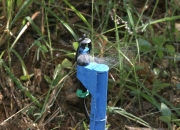 Irrigation in dry areas often leads to salinity in soils. To counteract this development the agricultural engineer Prof. Dr. Joachim Müller developed a new technology where the accumulated salts are washed out of the soils by a drainage system and the drained water is then reused for salt tolerant crops. To reduce waste of water in irrigation systems his team also developed a special sensor technology, determining the water status of the soil and how much suction power plants must apply to get water. Depending on the information given by the new system the farmers can switch the irrigation system on or off. Other sensors developed can measure water demand on roots and leaves. Deficit irrigation is another technology developed by the researchers, where fruit trees are put under specific drought stress at a specific stage of growth to induce a reduction in crown growth to the benefit of fruit development.
Irrigation in dry areas often leads to salinity in soils. To counteract this development the agricultural engineer Prof. Dr. Joachim Müller developed a new technology where the accumulated salts are washed out of the soils by a drainage system and the drained water is then reused for salt tolerant crops. To reduce waste of water in irrigation systems his team also developed a special sensor technology, determining the water status of the soil and how much suction power plants must apply to get water. Depending on the information given by the new system the farmers can switch the irrigation system on or off. Other sensors developed can measure water demand on roots and leaves. Deficit irrigation is another technology developed by the researchers, where fruit trees are put under specific drought stress at a specific stage of growth to induce a reduction in crown growth to the benefit of fruit development.
Contact: Prof. Dr. Joachim Müller, University of Hohenheim, Institute of Agricultural Engineering. working group: Agricultural Engineering in the tropics and subtropics, Tel.: 0711 / 459 22490, fax: 0711 / 459 23298, E-Mail: joachim.mueller@uni-hohenheim.de
Optimal water use strategies
To use water in the most efficient way
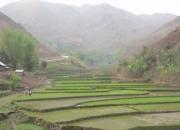 Irrigation, electricity, fish farming or simply for drinking purposes: humanity uses water for many different purposes. This can easily lead to conflicts, because clean water is becoming increasingly scarce. The agricultural economist Prof. Dr. Thomas Berger is therefore dealing with the management of water resources. Which kind of water use is the most efficient and environmentally friendly one, that question is often not clear at the first sight. What is of more economic use the hydroelectric power station or the irrigation of fields? How can we find a reasonable balance of interests? And what are the environmental consequences? Often, water can be used easily several times in succession for various purposes. Another question is: where in agriculture can we save water when using modern technology and efficiency?
Irrigation, electricity, fish farming or simply for drinking purposes: humanity uses water for many different purposes. This can easily lead to conflicts, because clean water is becoming increasingly scarce. The agricultural economist Prof. Dr. Thomas Berger is therefore dealing with the management of water resources. Which kind of water use is the most efficient and environmentally friendly one, that question is often not clear at the first sight. What is of more economic use the hydroelectric power station or the irrigation of fields? How can we find a reasonable balance of interests? And what are the environmental consequences? Often, water can be used easily several times in succession for various purposes. Another question is: where in agriculture can we save water when using modern technology and efficiency?
Contact: Prof. Dr. Thomas Berger, University of Hohenheim, Institute of Agricultural Economics and Social Sciences, working group: Economics of Land Use in the tropics and subtropics, Tel: 0711 / 459 24116, fax: 0711 / 459 24248, E-Mail: i490d@uni-hohenheim.de
Living with water scarcity
The agricultural economist Prof. Dr. Reiner Doluschitz is screening new farming practices, crops, crop rotations and irrigation techniques in dry regions. He does cost benefit analyses for farmers and checks suggestions to optimize their operations. His analyses are not aiming at maximum profit in the short run, but involve long-term aspects and sustainability.
Dams are not only a serious intervention into nature, but also threaten peoples´ livelihoods and force them to adapt to the new conditions. Prof. Dr. Doluschitz is analysing different scenarios to allow farmers to adopt appropriate measures.
Contact: Prof. Dr. Reiner Doluschitz, University of Hohenheim, Institute of Farm Management. working group: Computer Applications and Business Management in Agriculture. Tel.: 0711 / 459 22841, fax: 0711 / 459 23481, E-Mail: Reiner.Doluschitz@uni-hohenheim.de
What is the value of the future?
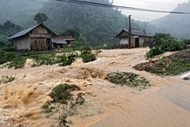 Climate change causes dry regions to get drier, leads to a raise in sea levels and an increased incidence of storm surges. When different adaptation strategies are in discussion, they have on thing in common: they are expensive. The environmental economist Prof. Dr. Michael Ahlheim tries to determine the social benefits of measures such as improved coastal protection and sustainable water management in dry areas. This allows the comparison of costs and possible benefits of the project. The economic valuation methods, the researchers apply are thus determining the social profitability of government projects in the environmental sector and can in this way contribute to ensure an economic use of public funds.
Climate change causes dry regions to get drier, leads to a raise in sea levels and an increased incidence of storm surges. When different adaptation strategies are in discussion, they have on thing in common: they are expensive. The environmental economist Prof. Dr. Michael Ahlheim tries to determine the social benefits of measures such as improved coastal protection and sustainable water management in dry areas. This allows the comparison of costs and possible benefits of the project. The economic valuation methods, the researchers apply are thus determining the social profitability of government projects in the environmental sector and can in this way contribute to ensure an economic use of public funds.
Contact: Prof. Dr. Michael Ahlheim, University of Hohenheim, Institute of Economics, working group: Economics, esp. Environmental Economics and Regulatory Policy, Tel: 0711 / 459 23596, fax: 0711 / 459 24081, E-Mail: ahlheim@uni-hohenheim.de
Social and political problems related to water
 Water supply in developing countries
Water supply in developing countries
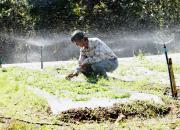 The agricultural economist Prof. Dr. Regina Birner is dealing with governance problems in irrigation management in developing countries. Areas of research include:
The agricultural economist Prof. Dr. Regina Birner is dealing with governance problems in irrigation management in developing countries. Areas of research include:
- Corruption in government infrastructure projects, whether in the construction of small dams in Ghana or large irrigation systems in India.
- Mismanagement and political influence on the water distribution in irrigation systems, administrated by governments
- Impact of national irrigation policies, e.g. subsidies for use of groundwater for irrigation, which can cause an overuse in the case of India.
Prof. Dr. Birner is focusing on specific reform measures to counteract the described problems, for example by handing over the management of irrigation systems to water user corporations.
Contact: Prof. Dr. Regina Birner, University of Hohenheim, Institute of Agricultural Economics and Social Sciences in the tropics and subtropics, working group: Social and Institutional Change in Agricultural Development, Tel: 0711 / 459 23517, fax: 0711 / 459 23812, E-Mail: Regina.Birner@uni-hohenheim.de
Strategies against desertification, erosion and pollution
How to mitigate erosion and its negative effects
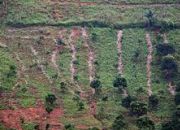 In a special research programme in the mountainous areas of Northern Thailand and Vietnam the agricultural agronomist Prof. Dr. Georg Cadisch is investigating into erosion protection mechanisms. The employment of nurse crops together with minimum tillage has been promising. Farmers give up multiply plowing, cultivate leguminous plants between two cropping cycles and thus reduce the time of uncovered soil exposure. The strategy is offering various benefits to farmers: reduced soil cultivation and the harvested legumes improve soils and can be used as cattle feed. If erosion still occurs the consequences are widely felt. Prof. Dr. Cadisch's research has shown that the eroded soil and the nutrients get lost into to the rice fields in the valleys and further on deposit in lakes and rivers, causing even more problems.
In a special research programme in the mountainous areas of Northern Thailand and Vietnam the agricultural agronomist Prof. Dr. Georg Cadisch is investigating into erosion protection mechanisms. The employment of nurse crops together with minimum tillage has been promising. Farmers give up multiply plowing, cultivate leguminous plants between two cropping cycles and thus reduce the time of uncovered soil exposure. The strategy is offering various benefits to farmers: reduced soil cultivation and the harvested legumes improve soils and can be used as cattle feed. If erosion still occurs the consequences are widely felt. Prof. Dr. Cadisch's research has shown that the eroded soil and the nutrients get lost into to the rice fields in the valleys and further on deposit in lakes and rivers, causing even more problems.
Contact: Prof. Dr. Georg Cadisch, University of Hohenheim, Institute of Plant Production and Agroecology in the tropics and subtropics, working group: Crop Production in the tropics and subtropics, Tel: 0711 / 459 22438, fax: 0711 459-22304, E-Mail: georg.cadisch@uni-hohenheim.de
Planting trees without irrigation
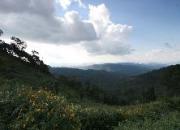 The northeast of Brazil is threatened by desertification, because forest areas are still logged for firewood and charcoal production and areas are intensively used and overgrazed by animal production. The agricultural ecologist Dr. Jörg Germer intends to counteract this development by promoting beneficial, native tree species offering income opportunities for the local population. Planting seedlings in a plant nutrient-enriched mixture of natural sand, goat manure and clay to preserve rainwater where it is needed and with the help of a special plant coal that nutrients are not washed out as quickly, shall promote the multiplication of the trees without irrigation.
The northeast of Brazil is threatened by desertification, because forest areas are still logged for firewood and charcoal production and areas are intensively used and overgrazed by animal production. The agricultural ecologist Dr. Jörg Germer intends to counteract this development by promoting beneficial, native tree species offering income opportunities for the local population. Planting seedlings in a plant nutrient-enriched mixture of natural sand, goat manure and clay to preserve rainwater where it is needed and with the help of a special plant coal that nutrients are not washed out as quickly, shall promote the multiplication of the trees without irrigation.
Contact: Dr. Jörg Germer, University of Hohenheim, Institute of plant production and Agroecology in the tropics and subtropics, working group: Agroecology in the tropics and subtropics, Tel.: 0711 / 459 23505, fax: 0711 / 459 23629, E-Mail: jgermer@uni-Hohenheim.de
Absorption and release of water in plants
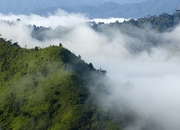 The world consists of two spheres: the atmosphere (air) and the pedosphere (soil) with water being abundant in both of them. But how does water exchange between the two spheres function? Prof. Dr. Thilo Streck is bio-geo physicist and dealing with this question. Plants play an important role in this process, as they absorb water from the soil and evaporate it through their leaves into the air. I this way they also affect the rate of precipitation. Another research focus is the transport and transformation of pesticides and other environmentally harmful chemicals from the soil into ground and surface water.
The world consists of two spheres: the atmosphere (air) and the pedosphere (soil) with water being abundant in both of them. But how does water exchange between the two spheres function? Prof. Dr. Thilo Streck is bio-geo physicist and dealing with this question. Plants play an important role in this process, as they absorb water from the soil and evaporate it through their leaves into the air. I this way they also affect the rate of precipitation. Another research focus is the transport and transformation of pesticides and other environmentally harmful chemicals from the soil into ground and surface water.
Contact: Prof. Dr. Thilo Streck, University of Hohenheim, Institute for Soil Science and Land Evaluation, working group: Biogeophysics, Tel: 0711 / 459 22796, fax: 0711 / 459 23117, E-Mail: thilo.streck@uni-hohenheim.de
Preparing for climate change
From evaporation to humidity up to the formation of clouds and precipitation: The atmospheric scientist Prof. 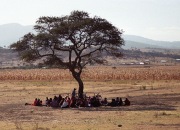 Volker Wulfmeyer is working on a model that represents the entire water cycle, with all its interactions and impact, which also simulates extreme events such as prolonged droughts and torrential rains. The reason is due to the fact that such events could become more frequent due to climate change. It is important to prepare for these changes in order to keep the damage to agriculture, industry and society as low as possible. The Institute of Physics and Meteorology with its new climate and weather simulations is integrated in international working groups of the UN Climate Change and World Weather Research Programme and thus brings a level of expertise to the University of Hohenheim, which is otherwise found almost exclusively in large research institutions.
Volker Wulfmeyer is working on a model that represents the entire water cycle, with all its interactions and impact, which also simulates extreme events such as prolonged droughts and torrential rains. The reason is due to the fact that such events could become more frequent due to climate change. It is important to prepare for these changes in order to keep the damage to agriculture, industry and society as low as possible. The Institute of Physics and Meteorology with its new climate and weather simulations is integrated in international working groups of the UN Climate Change and World Weather Research Programme and thus brings a level of expertise to the University of Hohenheim, which is otherwise found almost exclusively in large research institutions.
Related links:
Climate simulations in the journal Climate Dynamics (2013)
Working Group of World Climate Research
Working Group of the World Meteorological Organization
Contact: Prof. Dr. Volker Wulfmeyer, University of Hohenheim, Institute for Physics and Meteorology, Tel.: 0711/459 22150, Fax: 0711/459 22461, Email: volker.wulfmeyer@uni-hohenheim.de
